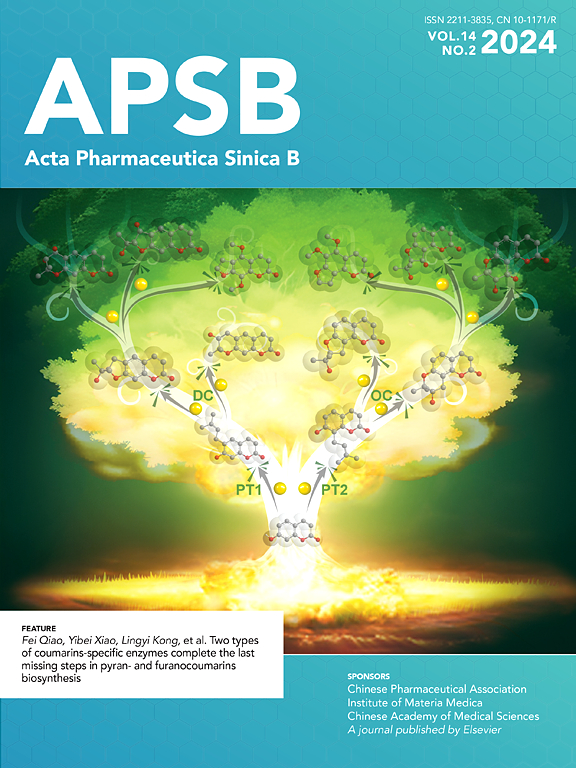靶向cdh17的CAR-NK细胞与CD47抑制剂协同抑制胃肠道癌症
IF 14.6
1区 医学
Q1 PHARMACOLOGY & PHARMACY
引用次数: 0
摘要
胃肠道(GI)癌症是全球癌症发病率和死亡率的主要原因。尽管治疗取得了进展,但癌症复发仍然是一个重大挑战,需要新的治疗策略。在这项研究中,我们设计了靶向cadherin 17 (CDH17)的纳米体嵌合抗原受体(CAR)自然杀伤(NK)细胞来治疗胃肠道肿瘤。此外,为了增强CAR-NK细胞的疗效,我们还加入了CD47-SIRPα轴抑制剂CV1,以评估该组合的抗肿瘤效果。我们发现CDH17-CAR-NK细胞以cdh17依赖的方式有效地消除胃肠道癌细胞。CDH17-CAR-NK细胞在癌细胞来源的异种移植和患者来源的异种移植小鼠模型中也表现出强大的体内抗肿瘤作用。此外,cd47信号调节蛋白α (SIRPα)轴抑制剂CV1可协同增强CDH17-CAR-NK细胞的抗肿瘤活性,可能是通过增强巨噬细胞激活和肿瘤微环境中m1表型巨噬细胞的增加。总的来说,我们的研究结果表明,靶向cdh17的CAR-NK细胞是治疗胃肠道癌症的一种有希望的策略。CDH17-CAR-NK细胞与CV1的结合成为克服CAR-NK治疗局限性的潜在组合方法。需要进一步的研究来加速这些发现的临床转化。本文章由计算机程序翻译,如有差异,请以英文原文为准。

CDH17-targeting CAR-NK cells synergize with CD47 blockade for potent suppression of gastrointestinal cancers
Gastrointestinal (GI) cancers are a leading cause of cancer morbidity and mortality worldwide. Despite advances in treatment, cancer relapse remains a significant challenge, necessitating novel therapeutic strategies. In this study, we engineered nanobody-based chimeric antigen receptor (CAR) natural killer (NK) cells targeting cadherin 17 (CDH17) for the treatment of GI tumors. In addition, to enhance the efficacy of CAR-NK cells, we also incorporated CV1, a CD47–SIRPα axis inhibitor, to evaluate the anti-tumor effect of this combination. We found that CDH17-CAR-NK cells effectively eliminated GI cancers cells in a CDH17-dependent manner. CDH17-CAR-NK cells also exhibit potent in vivo anti-tumor effects in cancer cell-derived xenograft and patient-derived xenograft mouse models. Additionally, the anti-tumor activity of CDH17-CAR-NK cells is synergistically enhanced by CD47–signal regulatory protein α (SIRPα) axis inhibitor CV1, likely through augmented macrophages activation and an increase in M1-phenotype macrophages in the tumor microenvironment. Collectively, our findings suggest that CDH17-targeting CAR-NK cells are a promising strategy for GI cancers. The combination of CDH17-CAR-NK cells with CV1 emerges as a potential combinatorial approach to overcome the limitations of CAR-NK therapy. Further investigations are warranted to speed up the clinical translation of these findings.
求助全文
通过发布文献求助,成功后即可免费获取论文全文。
去求助
来源期刊

Acta Pharmaceutica Sinica. B
Pharmacology, Toxicology and Pharmaceutics-General Pharmacology, Toxicology and Pharmaceutics
CiteScore
22.40
自引率
5.50%
发文量
1051
审稿时长
19 weeks
期刊介绍:
The Journal of the Institute of Materia Medica, Chinese Academy of Medical Sciences, and the Chinese Pharmaceutical Association oversees the peer review process for Acta Pharmaceutica Sinica. B (APSB).
Published monthly in English, APSB is dedicated to disseminating significant original research articles, rapid communications, and high-quality reviews that highlight recent advances across various pharmaceutical sciences domains. These encompass pharmacology, pharmaceutics, medicinal chemistry, natural products, pharmacognosy, pharmaceutical analysis, and pharmacokinetics.
A part of the Acta Pharmaceutica Sinica series, established in 1953 and indexed in prominent databases like Chemical Abstracts, Index Medicus, SciFinder Scholar, Biological Abstracts, International Pharmaceutical Abstracts, Cambridge Scientific Abstracts, and Current Bibliography on Science and Technology, APSB is sponsored by the Institute of Materia Medica, Chinese Academy of Medical Sciences, and the Chinese Pharmaceutical Association. Its production and hosting are facilitated by Elsevier B.V. This collaborative effort ensures APSB's commitment to delivering valuable contributions to the pharmaceutical sciences community.
 求助内容:
求助内容: 应助结果提醒方式:
应助结果提醒方式:


